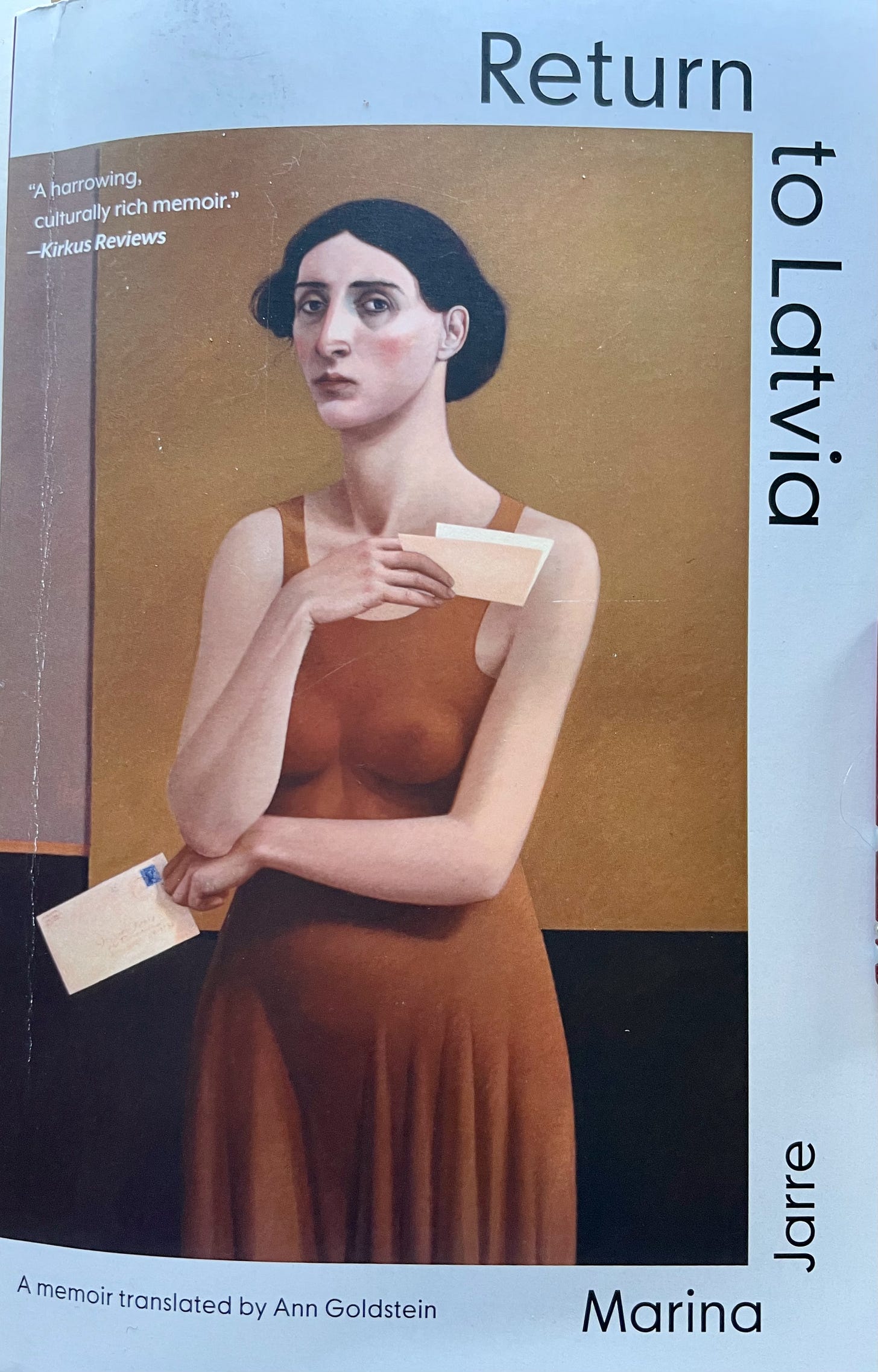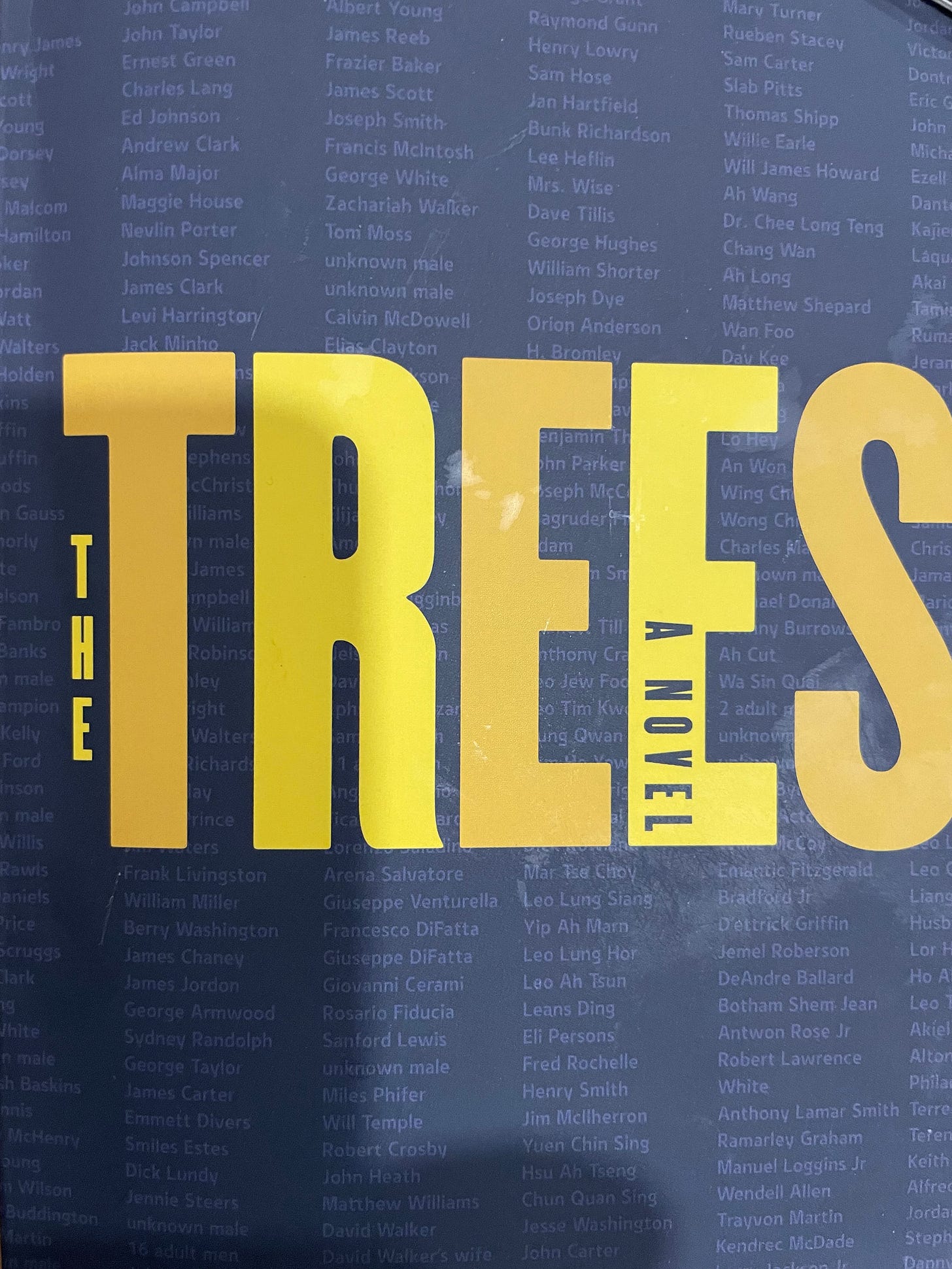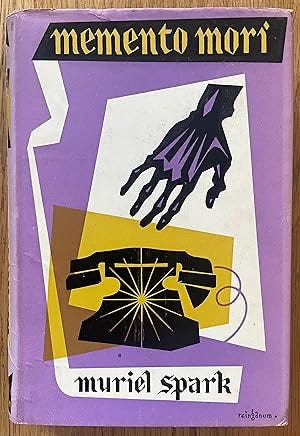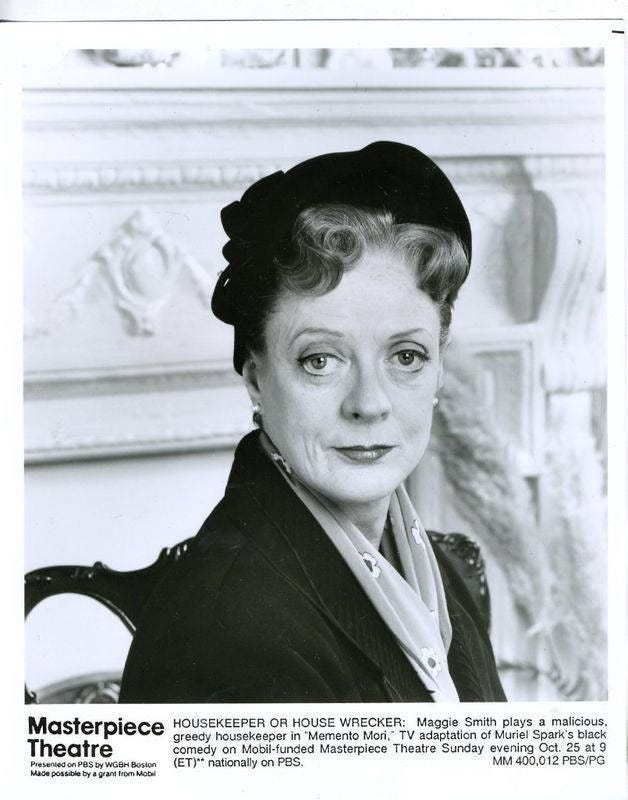After seven weeks abroad, I'm back in Toronto where I discovered that my beloved Public Library had taped up its book return.
However, today they posted a video promising that their books would soon be on the move again. In the meantime, here’s what I've been reading.
#6 in 2024
While the director and cinematographer talk and adjust the cameras, the prop woman tells you to pick a book from the bookshelf — any book that appeals. You select a book of poetry by Rumi, an English translation. You flip through until you find a title that appeals to you and you read the poem four times:
THE DIVER’S CLOTHES LYING EMPTY
A woman runs off to Morocco to escape her family drama; as she checks into her hotel, her backpack is stolen, and it contains her entire life. From that point on she is flung into a constant improvisation, which includes being cast as a stand-in for a famous Hollywood actress and changing identities like underwear.
I studied fiction with the celebrated Dionne Brand, and she insisted that we shouldn’t write in the present tense, arguing that it was impossible to sustain suspense that way. Vendela Vida did not get her memo. The Diver’s Clothes Lie Empty is written in the second person present and I romped through the entire book while crisscrossing Paris on the Metro and no pickpockets managed to filch my wallet or my attention. Lena Dunham, Sheila Heti, and George Saunders also really liked this book. They are not all my favourite people, but one of them is.
#7 in 2024
I stayed with my bookish friend Maureen in Dublin, the capital of that country that loves its writers to bits. There is even a Museum of Literature Ireland whose acronym is a pun: MoLI = Molly, heroine of James Joyce’s Ulysses.
There is no Museum of Literature Canada. Just saying. Wouldn’t be hard to start one.
Maureen couldn’t stop talking about Prophet Song. I hadn’t read it. “What a great title,” Maureen said. I didn’t think so. We argued, amicably. Another transatlantic flight loomed and so I bought a copy to read on the plane rather than watch more episodes of Season Nineteen of Grey’s Anatomy.
The silent, seated faces gaping at their phones.
To say this Booker Prize-winning novel by Paul Lynch is ‘a good read’ is to damn it with faint praise. This is a stunning read. The story is so suspenseful that I had to put it down at times, because I could not bear to find out what would happen next. The premise is that an extreme right-wing party has taken control of Ireland. The story follows a mother with four children whose husband is a trade unionist and disappears. If this were a tale about Nazi Germany, or Russia, or Chile or Afghanistan or Argentina, the thud of tightening restrictions would be only too familiar. But since it’s set in Dublin, in the age of smartphones and internet, the story of compliance, political violence, bloody resistance and flight is more than shocking. By the end, I understood why Lynch calls his book Prophet Song. Really, there’s no other title available. Maureen was right.
She slips into bed and rubs her feet and wakes into wild light, hearing a hoarse shout of wind, the window slapped with wet gravel. She steps drowsy to the window feeling as though the house were in flight, the house turning in the wind.
This book, too, is written in the present tense. Sorry, Dionne.
If you change ownership of the institutions then you can change ownership of the facts, you can alter the structure of belief, what is agreed upon, that is what they are doing, Eilish, it is really quite simple, … if you say one thing is another thing and you say it enough times, then it must be so, and if you keep saying it over and over people accept it as true — this is an old idea, of course, it really is nothing new, but you’re watching it happen in your own time and not in a book.
they take something from you and replace it with silence and you’ re confronted by that silence every waking moment and cannot live, you cease to be yourself and become a thing before this silence, a thing waiting for the silence to end, a thing on your knees begging and whispering to it all night and day
#8 in 2024
Oh, dear, I feel a rant coming on.
Take Marina Jarre’s memoir Return to Latvia and put it on the stack of books which are written about Latvia from a position of ignorance. Also get a sticker and a black magic marker and write WARNING: THIS BOOK IS DULL. Stick it on the cover. Thank you. Now I feel better.
Jarre is a well-known novelist in Italy with seventeen books to her name, hopefully not all as tedious as this one. She left Latvia at the age of ten after her Italian mother had an acrimonious divorce from her Russian Jewish father. Papi disappears during the Nazi occupation of 1941 as did 93% of all Latvian Jews. In 1999, Jarre goes on a search for her roots.
Though she doesn’t speak a word of Latvian, she insists on calling herself a Latvian. Moments of self-criticism are fleeting.
As a child — I think later — I lived on a German island, essentially not unlike people who live in a colony in a conquered country; but I wasn't the daughter of a conqueror.
She calls herself a Latvian but she doesn’t know a single Latvian and doesn’t speak to 'them’. They are faceless cartoon characters, fodder for morbid imaginings.
The tall, blond, pale-skinned men and women, appearing almost two-dimensional with their broad, flat surfaces -- that was how I recalled the Latvians.. the large, pale, blond bodies that in a certain way appeared unfinished, yet to be shaped...
While Pietro and I were in Latvia, the only Latvians I had looked in the eye had been, basically, the small tidy airport worker and the kind policeman at the markets. The others were part of an indistinguishable mass.
Indistinguishable though they may be, the Latvians are to be castigated for the Holocaust, and Jarre’s lopsided research takes up a large part of the book. Why didn’t the Latvians fight harder to stop the murders of the Jews? she asks. Why were they so passive? Was it because Latvians were greedy for money? Or were they simply insane?
Words escape me. (In case you don’t know, I’ve written a memoir set in WWII, I’ve done masses of research, and since I’m Latvian Canadian, I don’t like being othered.)
But the question is sound.
Why were the Germans so passive, Ms. Jarre? And the French? The Americans? Why are people passive when something terrible is going on? Like we are, right now. Paul Lynch digs into that question in Prophet Song.
#9 in 2024
“Goddamit, I hate murder more than just about anything,” said Sheriff Red Jetty. “It can just ruin a day.”
A couple of White men in Mississippi are found murdered and mutilated with the corpse of a Black man seated nearby, their nuts in his cold hand. The Trees by Percival Everett escalates from that point on. This is a brisk political whodunit, a revenge fantasy in which the ghost of Emmett Till comes to exact retribution from his lynchers. The book starts whimsical and light, but as Everett gets more and more serious, as he describes how the horror that was lynching was called life in Black America, the whimsy dies. Everett has a lot of fun with names such as Doctor Reverend Fondle, Mayor Philworth Bass, Mortician Otis Easy, but when we get to the real names of those murdered, in an entire chapter spanning ten pages, the laughter ends, and oddly enough, so does the story.
#10 in 2024
On a lighter note, that being Death and old people.
Being over seventy is like being engaged in a war. All our friends are going or gone and we survive amongst the dead and dying as on a battlefield.
Are anonymous phone calls even a thing anymore? In Muriel Spark’s witty novel Memento Mori, a group of elderly British people are harassed by a hoax-caller. They pick up the receiver and a voice says Remember you must die. If you’re too young to have used a rotary phone, you might not know how creepy that is. All the major characters are over seventy years old, apart from the wicked housekeeper, who is proud of being sexy at sixty.
At a post-crematorial party, the elderly long for cake and watch each other closely for signs of physical failure. There are characters with names like Tempest Sidebottome and a Dickensian old folks’ home. People change their wills before breakfast. I particularly relished a scene in which a mildly demented 86 year old woman tackles a heavy kettle to make tea for herself.
Muriel Spark was forty-one when she wrote this book and was relatively unknown. The Prime of Miss Jean Brodie was still in the future. I’ve been reading all of Percival Everett, but find myself fatigued; should I read all of Spark? She has written twenty-two books, but I’m not sure I can endure the lark-y English when-is-tea settings.
Who should be my featured author, bookish friends?
Not American. Not male. Not Maggie O’Farrell, Rebecca West or Virginia Woolf, because I’ve read all their work, and not Iris Murdoch, because I tried.
Your candidate?
*
After writing today’s newsletter, I went to hear Paul Lynch speak at the Toronto Reference Library. He reminds me so much of Pete Townshend of The Who that I have to resist my desire to hold a lighter in the air and sway. Although holding a lighter up would make sense, since Lynch talked about how writing into the modern chaos was like holding a match up in the darkness. He spoke deeply about the process of writing, about how his book was rooted in grief, how we reap this bitter crop of the unforeseen and this is what he said about the present tense:
Sentences should press into the unknown moment, into the most obscure hidden aspects of life, that which is barely known but asking to be revealed.




It was a sombre though happy encounter with this great writer and to get a sense of him all you have to do is watch the moment when he wins the Booker Prize.
Afterwards I made a small pilgrimage to light a real candle. The murder of Alexei Navalny makes me overwhelmingly sad, and I wanted to join my fellow Torontonians who were surely gathering in anger and despair in front of the Russian consulate. No one was there, but I wasn’t the only one with a match.
*
Currently reading: Leila Slimani, Sexe et Mensonges: la vie sexuelle au Maroc (thank you, Melissa and Google Translate)
Books I gave up on: Christopher Moore, Shakespeare for Squirrels, Julia May Jonas, Vladimir; Viola Davis, Finding Me
Still to go:
Second Latest Title Saved: Anne Brontë, The Tenant of Wildfell Hall, 1848
The Random List: Eliza Minot, The Tiny One (know nothing, novel, 1999)
Edmund St. Aubyns, Mother’s Milk (part of the Patrick Melrose series, might as well read the whole thing, 2006)











Love these posts of yours, the only downside being that feeling of I'll-never-managae-to-read-even-a-fraction-of-these-great-books! Have you read Lauren Groff, yet? Was recently turned on to her. Thoroughly enjoyed Matrix, and Fate & Furies! In an NYT interview I read, turns out she reads 300 books a year! Yikes! How is that humanly possible?!